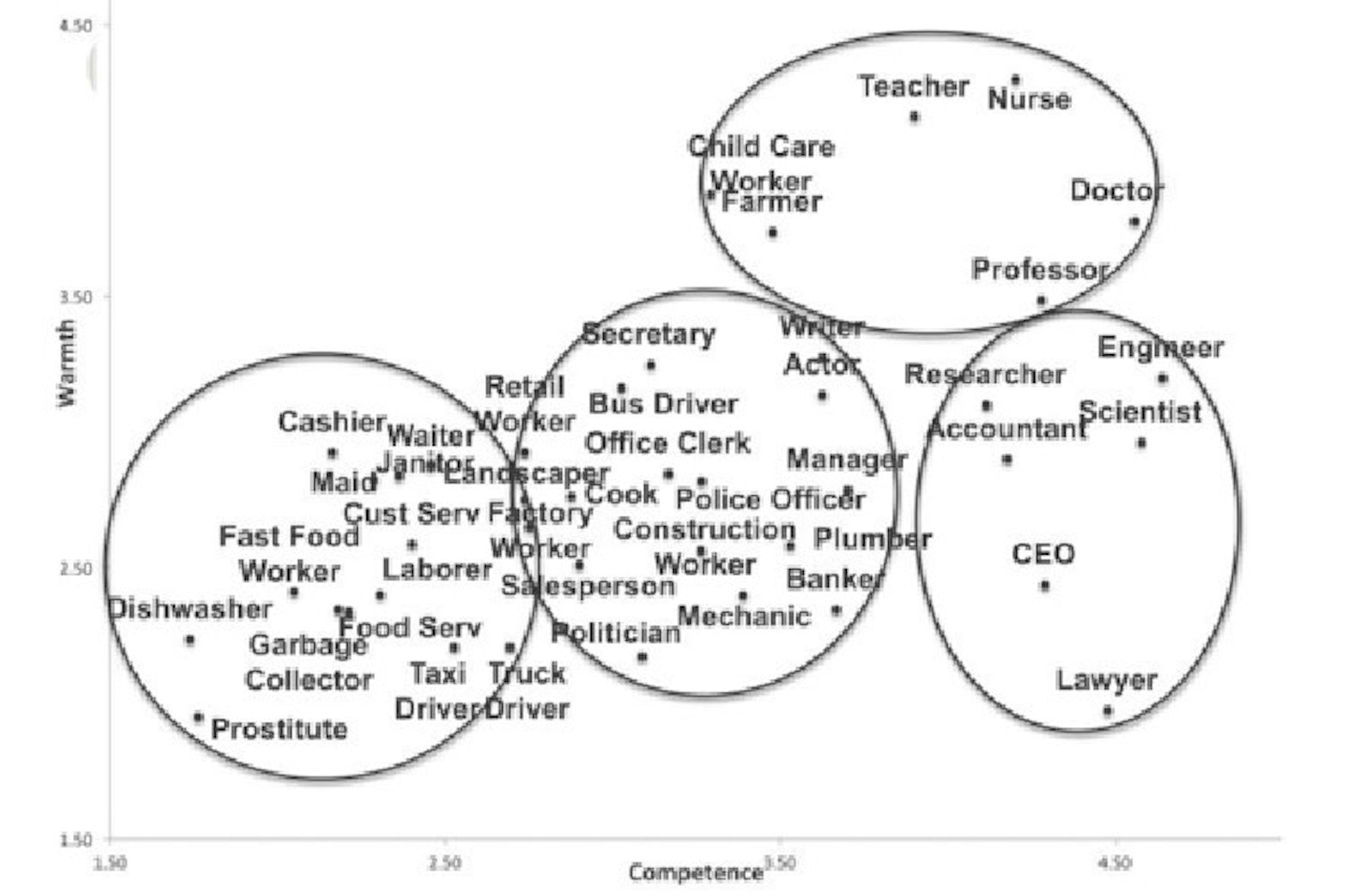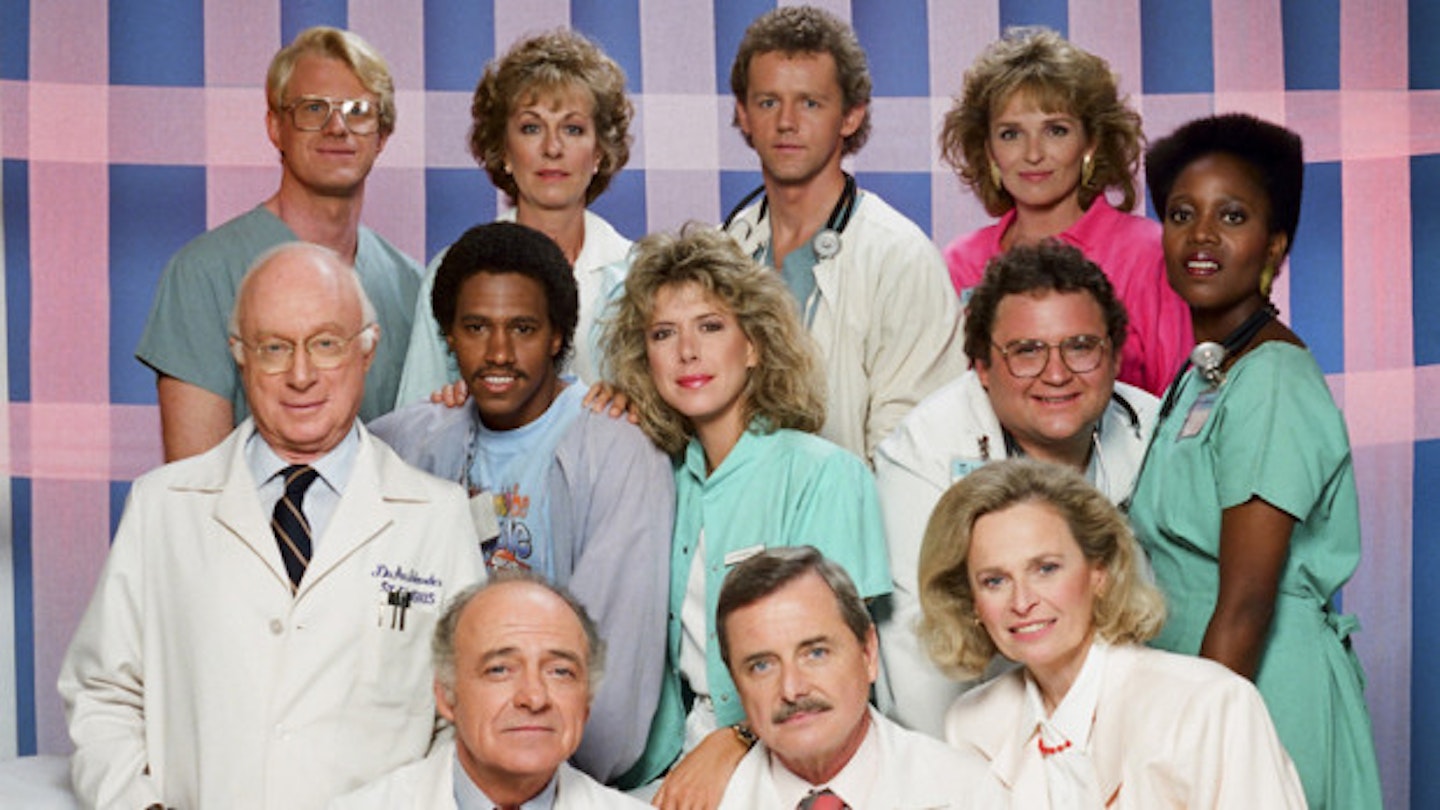Each day, millions of people across the world wake up, get themselves washed, dressed and fed and make their way to work. OK, one too many crammed-in journeys on public transport might have taught you, via BO and morning-breath, that perhaps two of these things aren’t necessarily accomplished, but you get our drift. People, hopefully, work.
Though working is a bit of a (sometimes sad) necessary, you’d hope that in your leisure time you don’t have to be defined by what you do to make ends meet. But of course, with most of our lives spent at work (sorry to bum you out), it turns out that what you do day in, day out, shapes what people think of you.

This chart, drawn up by Susan Fiske, a psychology and public policy professor at Princeton University, along with graduate student Cydney Dupree, shows just that. It was made, The New Yorker reports, by asking a big group of people online to generate a list of jobs. The most-named 42 jobs were then picked and then another online group was asked to rate each of the jobs in terms of ‘competence’ and ‘warmth.’ You can browse it to get an idea of where your job is, but don't take it too seriously, as the things we've learned from it might show how silly some of our assumptions can be:
1. Professional people are seen as more competent
Engineers, doctors, lawyers and the like are all seen as more competent than their fast-food worker, dishwasher and garbage collector cohorts. Which isn’t entirely fair. The assumption runs that if people are doing a job that involves a high level of skill within that field, that they’re overall more competent than people who are doing a job requiring less skill. However, that’s rubbish – competency is all relative. Doctors aren’t necessarily more competent than people who collect bins, they might be really crap at collecting bins!
Plus, some of those fast-food workers assemble some really tasty burgers. That's the sort of day-to-day competence we like.
READ MORE: Study Says Commuting Via Public Transport Is More Relaxing Than Driving
2. Teachers and nurses are competent AND warm (but get paid so very little)
Teachers and nurses, people who basically care for the vulnerable, have the highest competence x warmth levels. But they earn relatively little compared to other people at the same competence levels as them (CEOs, engineers, lawyers). Surely the people who are good at their jobs and kind are worth giving a little more pay to? Maybe the whole point is that they’re nice precisely because they’re paid so little.
3. People kind of like writers
It makes us feel better about ourselves, but there’s totally a difference between ‘writer’ and ‘journalist’ and after the hacking scandal, we’re not really sure that British people would rate journalists too highly on their much competency or warmth…
READ MORE: Five Things You Should do In The Office At 6pm Tonight
4. Politicians aren't too respected, coming out as less competent than mechanics and colder than bankers
There are very few white-collar jobs (ones where you use your mind more than your actual body to get stuff done) in the middle of the chart, but ‘politician’ sticks out. Though some of them might actually be trained as lawyers or have risen through the ranks to become CEO before doing the old switch-a-roo to politics, the stereotype of a politician is just too strong to make you seem any less crap or mean.
5. Farmers are meant to be nice, but are they really?
Thanks to childhood tales like Old MacDonald and all those Aesopian fables of kindly farmers and Biblical tales of meek shepherds, we’ve got this idea that farmers are really proper salt of the earth, perma-grins attached to muddy-trousered. And the chart agrees, placing them right next to childcare workers in terms of warmth and competence. However, over here in the UK, farmers tend to be really rich, own land in a country where land is worth loads, and if you're spending all day either composting plants or dealing with animal muck, you’re probably more used to poo than human contact. Does that really make you a warm person? Figuratively warm, of course.
All in all, the chart puts into perspective the way we treat jobs and the people who do them. And maybe, just maybe, makes us more sensitive to the fact that not everyone is doing what they want to do, or is even that happy doing what they want to do. So we should probably get to know someone before we judge them right after the ‘so what do you do?’ question. Oh, and if we like fast food that much, we should probably just think better of the people who serve it to us.
Like this? You might also be interested in:
There's A Great Big 'Ass' In Glass Ceiling - How Being Overweight Affected My Career
Apparently It Will Take Another 75 Years Before Women Start Earning As Much As Men
Things To Buy To Take Your Desk From Your Hated Place To Your Happy Place
Follow Sophie on Twitter @sophwilkinson
This article originally appeared on The Debrief.
